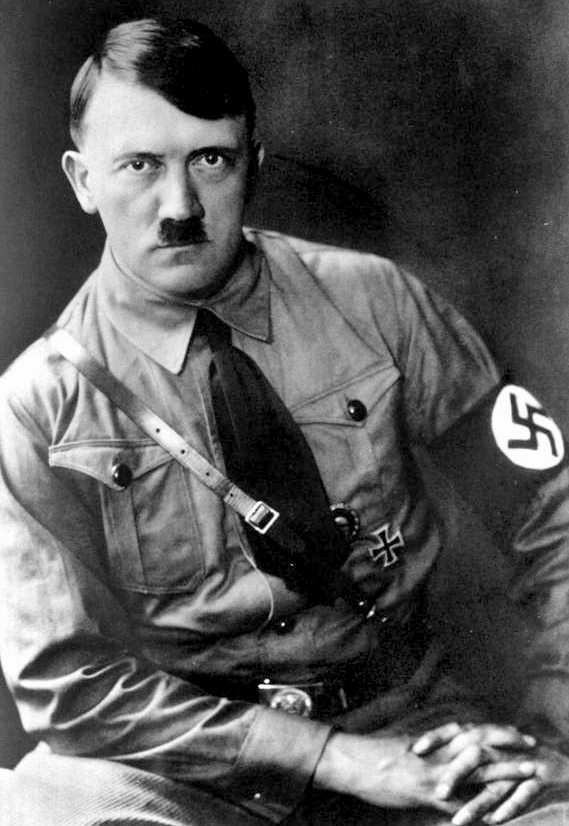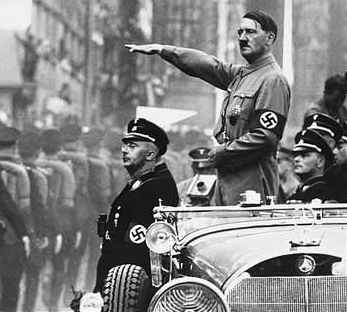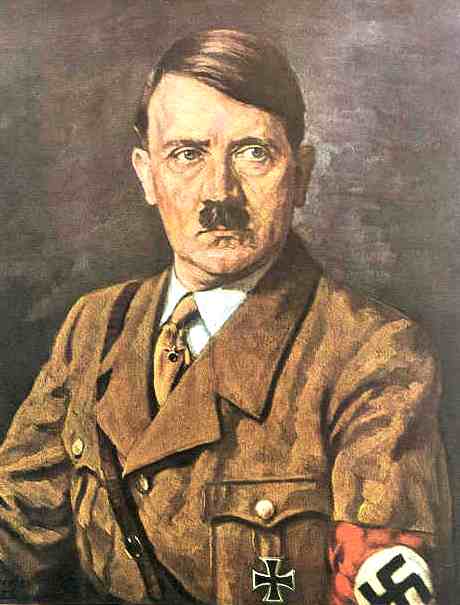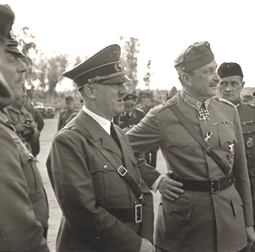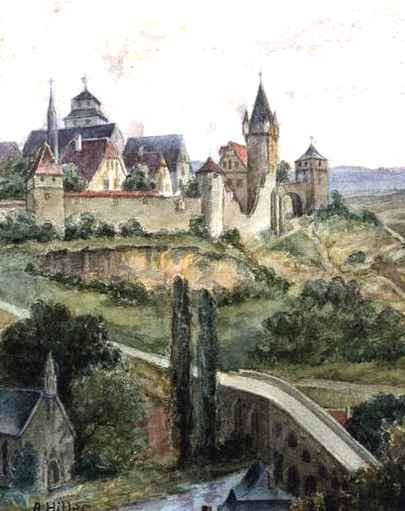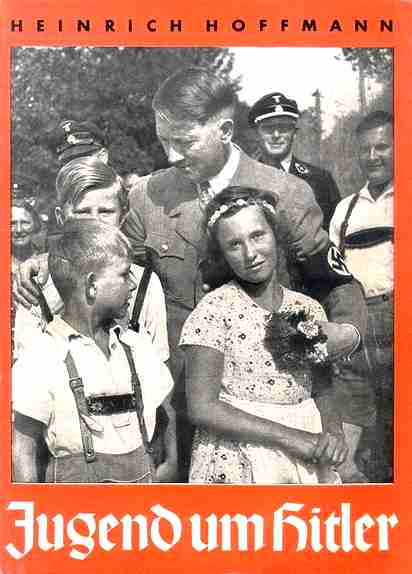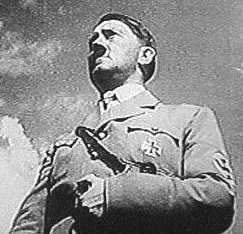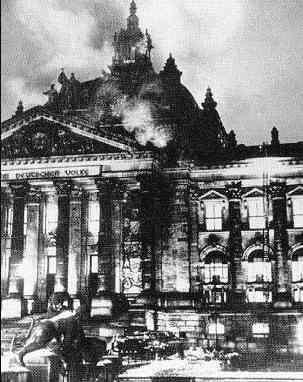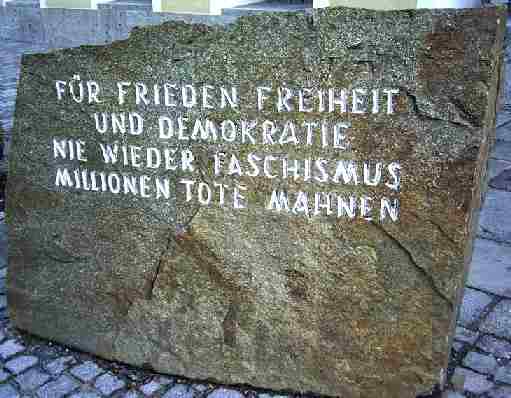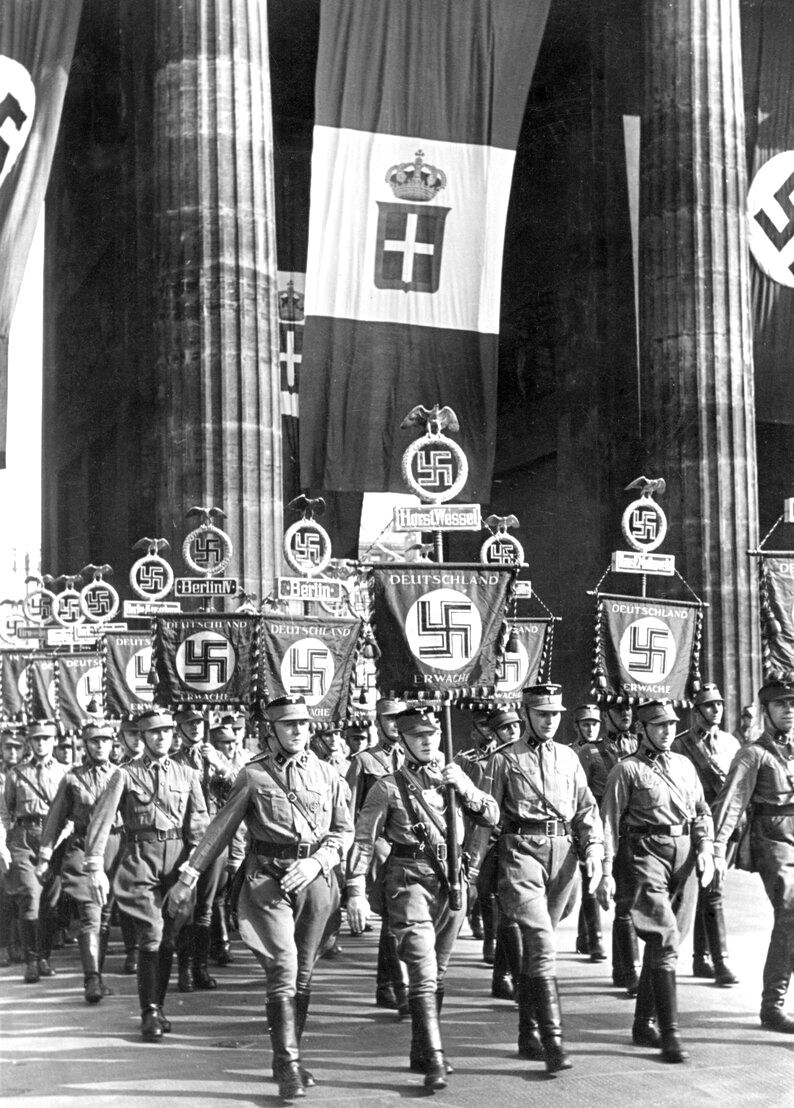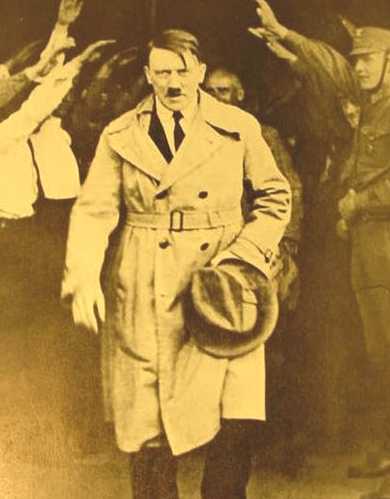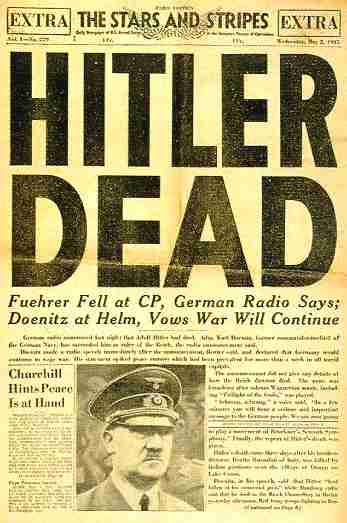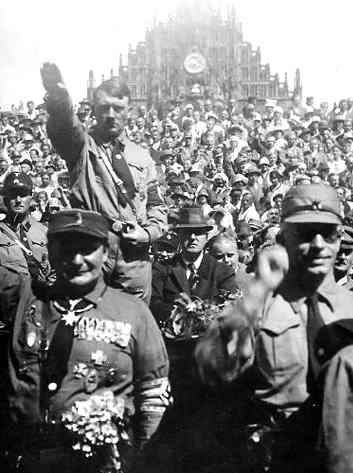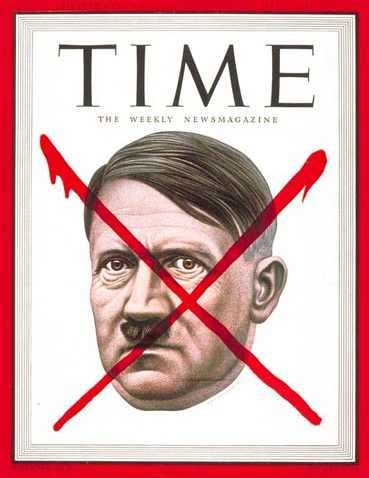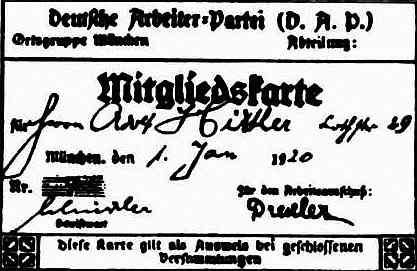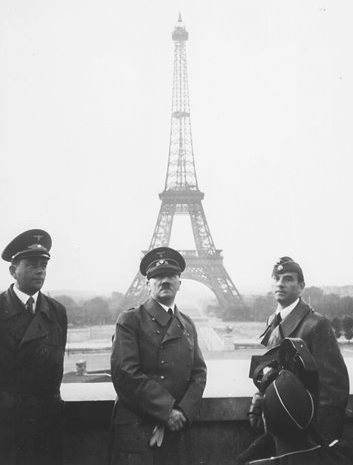|
ADOLF HITLER 1889 - 1945
|
|||||||
|
The avatar of fascism posed the century's greatest threat to democracy and redefined the meaning of evil forever
What was the secret of his power over his listeners? His demagogic appeal to immoderation, to excess and to simplifying hate? They spoke of his intuitive powers and his "luck" (he escaped several attempts on his life).
Adolf Hitler, was he a deranged genius along the lines of the Skynet computer in Terminator, or the incarnation of absolute evil; this is how future generations will remember the all-powerful Fuehrer of the criminal Third Reich. Compared with him, his peers Mussolini and Franco were novices. Under his hypnotic gaze, humanity crossed a threshold from which one could see the abyss. But was it really as easy to stamp out his vision, by just invading Nazi Germany?
Adolf Hitler and chum Heinrich Himmler
At the same time that Hitler terrorized his adversaries, he knew how to please, impress and charm the very interlocutors from whom he wanted support. Diplomats and journalists insist as much on his charm as they do on his temper tantrums. The savior admired by his own as he dragged them into his madness, the Satan and exterminating angel feared and hated by all others, Hitler led his people to a shameful defeat without precedent. That his political and strategic ambitions have created a dividing line in the history of this turbulent and tormented century is undeniable: there is a before and an after. By the breadth of his crimes, which have attained a quasi-ontological dimension, he surpasses all his predecessors: as a result of Hitler, man is defined by what makes him inhuman (in the European of Convention of Human Rights). With Hitler at the head of a gigantic laboratory, life itself seems to have changed.
If all this seems rather like the inner workings of your local authority, then we have struck a chord. When faced with criticism or found to have done wrong, council's tend to stonewall. As the pressure mounts, they try to crush complainants, avoid giving persons their right to a fair hearing. All thins considered, what is the difference between the way your council treat you and the way the Gestapo operated under Heinrich Himmler?
Founder and leader of the Nazi Party, Reich Chancellor and guiding spirit of the Third Reich from 1933 to 1945, Head of State and Supreme Commander of the Armed Forces, Adolf Hitler was born in Braunau am Inn, Austria, on 20 April 1889. The son of a fifty-two-year-old Austrian customs official, Alois Schickelgruber Hitler, and his third wife, a young peasant girl, Klara Poelzl, both from the backwoods of lower Austria, the young Hitler was a resentful, discontented child. Moody, lazy, of unstable temperament, he was deeply hostile towards his strict, authoritarian father and strongly attached to his indulgent, hard-working mother, whose death from cancer in December 1908 was a shattering blow to the adolescent Hitler.
After spending four years in the Realschule in Linz, he left school at the age of sixteen with dreams of becoming a painter. In October 1907, the provincial, middle-class boy left home for Vienna, where he was to remain until 1913 leading a bohemian, vagabond existence. Embittered at his rejection by the Viennese Academy of Fine Arts, he was to spend "five years of misery and woe" in Vienna as he later recalled, adopting a view of life which changed very little in the ensuing years, shaped as it was by a pathological hatred of Jews and Marxists, liberalism and the cosmopolitan Habsburg monarchy.
Existing from hand to mouth on occasional odd jobs and the hawking of sketches in low taverns, the young Hitler compensated for the frustrations of a lonely bachelor's life in miserable male hostels by political harangues in cheap cafes to anyone who would listen and indulging in grandiose dreams of a Greater Germany.
In Vienna he acquired his first education in politics by studying the demagogic techniques of the popular Christian-social Mayor, Karl Lueger, and picked up the stereotyped, obsessive anti-Semitism with its brutal, violent sexual connotations and concern with the "purity of blood" that remained with him to the end of his career. From crackpot racial theorists like the defrocked monk, Lanz von Liebenfels, and the Austrian Pan-German leader, Georg von Schoenerer, the young Hitler learned to discern in the "Eternal Jew" the symbol and cause of all chaos, corruption and destruction in culture, politics and the economy. The press, prostitution, syphilis, capitalism, Marxism, democracy and pacifism--all were so many means which "the Jew" exploited in his conspiracy to undermine the German nation and the purity of the creative Aryan race.
Adolf Hitler's portrait
In May 1913 Hitler left Vienna for Munich and, when war broke out in August 1914, he joined the Sixteenth Bavarian Infantry Regiment, serving as a despatch runner. Hitler proved an able, courageous soldier, receiving the Iron Cross (First Class) for bravery, but did not rise above the rank of Lance Corporal. Twice wounded, he was badly gassed four weeks before the end of the war and spent three months recuperating in a hospital in Pomerania. Temporarily blinded and driven to impotent rage by the abortive November 1918 revolution in Germany as well as the military defeat, Hitler, once restored, was convinced that fate had chosen him to rescue a humiliated nation from the shackles of the Versailles Treaty, from Bolsheviks and Jews.
Assigned by the Reichswehr in the summer of 1919 to "educational" duties which consisted largely of spying on political parties in the overheated atmosphere of post-revolutionary Munich, Hitler was sent to investigate a small nationalistic group of idealists, the German Workers' Party. On 16 September 1919 he entered the Party (which had approximately forty members), soon changed its name to the National Socialist German Workers' Party (NSDAP) and had imposed himself as its Chairman by July 1921.
Hitler discovered a powerful talent for oratory as well as giving the new Party its symbol — the swastika — and its greeting "Heil!." His hoarse, grating voice, for all the bombastic, humourless, histrionic content of his speeches, dominated audiences by dint of his tone of impassioned conviction and gift for self-dramatization. By November 1921 Hitler was recognized as Fuhrer of a movement which had 3,000 members, and boosted his personal power by organizing strong- arm squads to keep order at his meetings and break up those of his opponents. Out of these squads grew the storm troopers (SA) organized by Captain Ernst Röhm and Hitler's black-shirted personal bodyguard, the Schutzstaffel (SS).
Hitler focused his propaganda against the Versailles Treaty, the "November criminals," the Marxists and the visible, internal enemy No. 1, the "Jew," who was responsible for all Germany's domestic problems. In the twenty-five-point programme of the NSDAP announced on 24 February 1920, the exclusion of the Jews from the Volk community, the myth of Aryan race supremacy and extreme nationalism were combined with "socialistic" ideas of profit-sharing and nationalization inspired by ideologues like Gottfried Feder. Hitler's first written utterance on political questions dating from this period emphasized that what he called "the anti-Semitism of reason" must lead "to the systematic combating and elimination of Jewish privileges. Its ultimate goal must implacably be the total removal of the Jews."
By November 1923 Hitler was convinced that the Weimar Republic was on the verge of collapse and, together with General Ludendorff and local nationalist groups, sought to overthrow the Bavarian government in Munich. Bursting into a beer-hall in Munich and firing his pistol into the ceiling, he shouted out that he was heading a new provisional government which would carry through a revolution against "Red Berlin." Hitler and Ludendorff then marched through Munich at the head of 3,000 men, only to be met by police fire which left sixteen dead and brought the attempted putsch to an ignominious end.
Hitler was arrested and tried on 26 February 1924, succeeding in turning the tables on his accusers with a confident, propagandist speech which ended with the prophecy: "Pronounce us guilty a thousand times over: the goddess of the eternal court of history will smile and tear to pieces the State Prosecutor's submission and the court's verdict for she acquits us." Sentenced to five years' imprisonment in Landsberg fortress, Hitler was released after only nine months during which he dictated Mein Kampf (My Struggle) to his loyal follower, Rudolf Hess. Subsequently the "bible" of the Nazi Party, this crude, half-baked hotchpotch of primitive Social Darwinism, racial myth, anti-Semitism and lebensraum fantasy had sold over five million copies by 1939 and been translated into eleven languages.
The failure of the Beer-Hall putsch and his period of imprisonment transformed Hitler from an incompetent adventurer into a shrewd political tactician, who henceforth decided that he would never again confront the gun barrels of army and police until they were under his command. He concluded that the road to power lay not through force alone but through legal subversion of the Weimar Constitution, the building of a mass movement and the combination of parliamentary strength with extra-parliamentary street terror and intimidation. Helped by Goering and Goebbels he began to reassemble his followers and rebuild the movement which had disintegrated in his absence.
Adolf Hitler visits Ryti, Finland
In January 1925 the ban on the Nazi Party was removed and Hitler regained permission to speak in public. Outmaneuvering the "socialist" North German wing of the Party under Gregor Strasser, Hitler re-established himself in 1926 as the ultimate arbiter to whom all factions appealed in an ideologically and socially heterogeneous movement. Avoiding rigid, programmatic definitions of National Socialism which would have undermined the charismatic nature of his legitimacy and his claim to absolute leadership, Hitler succeeded in extending his appeal beyond Bavaria and attracting both Right and Left to his movement.
Though the Nazi Party won only twelve seats in the 1928 elections, the onset of the Great Depression with its devastating effects on the middle classes helped Hitler to win over all those strata in German society who felt their economic existence was threatened. In addition to peasants, artisans, craftsmen, traders, small businessmen, ex-officers, students and declasse intellectuals, the Nazis in 1929 began to win over the big industrialists, nationalist conservatives and army circles. With the backing of the press tycoon, Alfred Hugenberg, Hitler received a tremendous nationwide exposure just as the effects of the world economic crisis hit Germany, producing mass unemployment, social dissolution, fear and indignation. With demagogic virtuosity, Hitler played on national resentments, feelings of revolt and the desire for strong leadership using all the most modern techniques of mass persuasion to present himself as Germany's redeemer and messianic saviour.
In the 1930 elections the Nazi vote jumped dramatically from 810,000 to 6,409,000 (18.3 percent of the total vote) and they received 107 seats in the Reichstag. Prompted by Hjalmar Schacht and Fritz Thyssen, the great industrial magnates began to contribute liberally to the coffers of the NSDAP, reassured by Hitler's performance before the Industrial Club in Dusseldorf on 27 January 1932 that they had nothing to fear from the radicals in the Party. The following month Hitler officially acquired German citizenship and decided to run for the Presidency, receiving 13,418,011 votes in the run-off elections of 10 April 1931 as against 19,359,650 votes for the victorious von Hindenburg , but four times the vote for the communist candidate, Ernst Thaelmann. In the Reichstag elections of July 1932 the Nazis emerged as the largest political party in Germany, obtaining nearly fourteen million votes (37.3 per cent) and 230 seats. Although the NSDAP fell back in November 1932 to eleven million votes (196 seats), Hitler was helped to power by a camarilla of conservative politicians led by Franz von Papen, who persuaded the reluctant von Hindenburg to nominate "the Bohemian corporal" as Reich Chancellor on 30 January 1933.
Once in the saddle, Hitler moved with great speed to outmanoeuvre his rivals, virtually ousting the conservatives from any real participation in government by July 1933, abolishing the free trade unions, eliminating the communists, Social Democrats and Jews from any role in political life and sweeping opponents into concentration camps. The Reichstag fire of 27 February 1933 had provided him with the perfect pretext to begin consolidating the foundations of a totalitarian one-party State, and special "enabling laws" were ramrodded through the Reichstag to legalize the regime's intimidatory tactics.
A water-colour painting by Adolf Hitler
With support from the nationalists, Hitler gained a majority at the last "democratic" elections held in Germany on 5 March 1933 and with cynical skill he used the whole gamut of persuasion, propaganda, terror and intimidation to secure his hold on power. The seductive notions of "National Awakening" and a "Legal Revolution" helped paralyse potential opposition and disguise the reality of autocratic power behind a facade of traditional institutions.
The destruction of the radical SA leadership under Ernst Rohm in the Blood Purge of June 1934 confirmed Hitler as undisputed dictator of the Third Reich and by the beginning of August, when he united the positions of Fuhrer and Chancellor on the death of von Hindenburg, he had all the powers of State in his hands. Avoiding any institutionalization of authority and status which could challenge his own undisputed position as supreme arbiter, Hitler allowed subordinates like Himmler, Goering and Goebbels to mark out their own domains of arbitrary power while multiplying and duplicating offices to a bewildering degree.
During the next four years Hitler enjoyed a dazzling string of domestic and international successes, outwitting rival political leaders abroad just as he had defeated his opposition at home. In 1935 he abandoned the Versailles Treaty and began to build up the army by conscripting five times its permitted number. He persuaded Great Britain to allow an increase in the naval building programme and in March 1936 he occupied the demilitarized Rhineland without meeting opposition. He began building up the Luftwaffe and supplied military aid to Francoist forces in Spain, which brought about the Spanish fascist victory in 1939.
The German rearmament programme led to full employment and an unrestrained expansion of production, which reinforced by his foreign policy successes--the Rome-Berlin pact of 1936, the Anschluss with Austria and the "liberation" of the Sudeten Germans in 1938 — brought Hitler to the zenith of his popularity. In February 1938 he dismissed sixteen senior generals and took personal command of the armed forces, thus ensuring that he would be able to implement his aggressive designs.
Hitler's saber-rattling tactics bludgeoned the British and French into the humiliating Munich agreement of 1938 and the eventual dismantlement of the Czechoslovakian State in March 1939. The concentration camps, the Nuremberg racial laws against the Jews, the persecution of the churches and political dissidents were forgotten by many Germans in the euphoria of Hitler's territorial expansion and bloodless victories. The next designated target for Hitler's ambitions was Poland (her independence guaranteed by Britain and France) and, to avoid a two-front war, the Nazi dictator signed a pact of friendship and non-aggression with Soviet Russia. On 1 September 1939 German armies invaded Poland and henceforth his main energies were devoted to the conduct of a war he had unleashed to dominate Europe and secure Germany's "living space."
The first phase of World War II was dominated by German Blitzkrieg tactics: sudden shock attacks against airfields, communications, military installations, using fast mobile armor and infantry to follow up on the first wave of bomber and fighter aircraft. Poland was overrun in less than one month, Denmark and Norway in two months, Holland, Belgium, Luxemburg and France in six weeks. After the fall of France in June 1940 only Great Britain stood firm.
The Battle of Britain, in which the Royal Air Force prevented the Luftwaffe from securing aerial control over the English Channel, was Hitler's first setback, causing the planned invasion of the British Isles to be postponed. Hitler turned to the Balkans and North Africa where his Italian allies had suffered defeats, his armies rapidly overrunning Greece, Yugoslavia, the island of Crete and driving the British from Cyrenaica.
Heinrich Hoffmann's Jugend um Hitler - photo collection
The crucial decision of his career, the invasion of Soviet Russia on June 22, 1941, was rationalized by the idea that its destruction would prevent Great Britain from continuing the war with any prospect of success. He was convinced that once he kicked the door in, as he told Jodl (q.v.), "the whole rotten edifice [of communist rule] will come tumbling down" and the campaign would be over in six weeks. The war against Russia was to be an anti-Bolshivek crusade, a war of annihilation in which the fate of European Jewry would finally be sealed. At the end of January 1939 Hitler had prophesied that "if the international financial Jewry within and outside Europe should succeed once more in dragging the nations into a war, the result will be, not the Bolshevization of the world and thereby the victory of Jewry, but the annihilation of the Jewish race in Europe."
As the war widened — the United States by the end of 1941 had entered the struggle against the Axis powers — Hitler identified the totality of Germany's enemies with "international Jewry," who supposedly stood behind the British-American-Soviet alliance. The policy of forced emigration had manifestly failed to remove the Jews from Germany's expanded lebensraum, increasing their numbers under German rule as the Wehrmacht moved East.
The widening of the conflict into a world war by the end of 1941, the refusal of the British to accept Germany's right to continental European hegemony (which Hitler attributed to "Jewish" influence) and to agree to his "peace" terms, the racial-ideological nature of the assault on Soviet Russia, finally drove Hitler to implement the "Final Solution of the Jewish Question" which had been under consideration since 1939. The measures already taken in those regions of Poland annexed to the Reich against Jews (and Poles) indicated the genocidal implications of Nazi-style "Germanization" policies. The invasion of Soviet Russia was to set the seal on Hitler's notion of territorial conquest in the East, which was inextricably linked with annihilating the 'biological roots of Bolshevism' and hence with the liquidation of all Jews under German rule.
At first the German armies carried all before them, overrunning vast territories, overwhelming the Red Army, encircling Leningrad and reaching within striking distance of Moscow. Within a few months of the invasion Hitler's armies had extended the Third Reich from the Atlantic to the Caucasus, from the Baltic to the Black Sea. But the Soviet Union did not collapse as expected and Hitler, instead of concentrating his attack on Moscow, ordered a pincer movement around Kiev to seize the Ukraine, increasingly procrastinating and changing his mind about objectives. Underestimating the depth of military reserves on which the Russians could call, the caliber of their generals and the resilient, fighting spirit of the Russian people (whom he dismissed as inferior peasants), Hitler prematurely proclaimed in October 1941 that the Soviet Union had been "struck down and would never rise again." In reality he had overlooked the pitiless Russian winter to which his own troops were now condemned and which forced the Wehrmacht to abandon the highly mobile warfare which had previously brought such spectacular successes.
The disaster before Moscow in December 1941 led him to dismiss his Commander-in-Chief von Brauchitsch, and many other key commanders who sought permission for tactical withdrawals, including Guderian, Bock, Hoepner, von Rundstedt and Leeb, found themselves cashiered. Hitler now assumed personal control of all military operations, refusing to listen to advice, disregarding unpalatable facts and rejecting everything that did not fit into his preconceived picture of reality. His neglect of the Mediterranean theatre and the Middle East, the failure of the Italians, the entry of the United States into the war, and above all the stubborn determination of the Russians, pushed Hitler on to the defensive. From the winter of 1941 the writing was on the wall but Hitler refused to countenance military defeat, believing that implacable will and the rigid refusal to abandon positions could make up for inferior resources and the lack of a sound overall strategy.
Adolf Hitler in well known pose
Convinced that his own General Staff was weak and indecisive, if not openly treacherous, Hitler became more prone to outbursts of blind, hysterical fury towards his generals, when he did not retreat into bouts of misanthropic brooding. His health, too, deteriorated under the impact of the drugs prescribed by his quack physician, Dr. Theodor Morell. Hitler's personal decline, symbolized by his increasingly rare public appearances and his self-enforced isolation in the "Wolf's Lair," his headquarters buried deep in the East Prussian forests, coincided with the visible signs of the coming German defeat which became apparent in mid-1942.
Rommel's defeat at El Alamein and the subsequent loss of North Africa to the Anglo-American forces were overshadowed by the disaster at Stalingrad where General von Paulus's Sixth Army was cut off and surrendered to the Russians in January 1943. In July 1943 the Allies captured Sicily and Mussolini's regime collapsed in Italy. In September the Italians signed an armistice and the Allies landed at Salerno, reaching Naples on 1 October and taking Rome on June 4, 1944. The Allied invasion of Normandy followed on June 6, 1944 and soon a million Allied troops were driving the German armies eastwards, while from the opposite direction the Soviet forces advanced relentlessly on the Reich. The total mobilization of the German war economy under Albert Speer and the energetic propaganda efforts of Joseph Goebbels to rouse the fighting spirit of the German people were impotent to change the fact that the Third Reich lacked the resources equal to a struggle against the world alliance which Hitler himself had provoked.
Allied bombing began to have a telling effect on German industrial production and to undermine the morale of the population. The generals, frustrated by Hitler's total refusal to trust them in the field and recognizing the inevitability of defeat, planned, together with the small anti-Nazi Resistance inside the Reich, to assassinate the Fuhrer on 20 July 1944, hoping to pave the way for a negotiated peace with the Allies that would save Germany from destruction. The plot failed and Hitler took implacable vengeance on the conspirators, watching with satisfaction a film of the grisly executions carried out on his orders.
Berlin 1933 book burning
As disaster came closer, Hitler buried himself in the unreal world of the Fuhrerbunker in Berlin, clutching at fantastic hopes that his "secret weapons," the V-1 and V-2 rockets, would yet turn the tide of war. He gestured wildly over maps, planned and directed attacks with non-existent armies and indulged in endless, night-long monologues which reflected his growing senility, misanthropy and contempt for the "cowardly failure" of the German people.
As the Red Army approached Berlin and the Anglo-Americans reached the Elbe, on 19 March 1945 Hitler ordered the destruction of what remained of German industry, communications and transport systems. He was resolved that, if he did not survive, Germany too should be destroyed. The same ruthless nihilism and passion for destruction which had led to the extermination of six million Jews in death camps, to the biological "cleansing" of the sub-human Slavs and other subject peoples in the New Order, was finally turned on his own people. On April 29, 1945, he married his mistress Eva Braun and dictated his final political testament, concluding with the same monotonous, obsessive fixation that had guided his career from the beginning: "Above all I charge the leaders of the nation and those under them to scrupulous observance of the laws of race and to merciless opposition to the universal poisoner of all peoples, international Jewry."
The following day Hitler committed suicide, shooting himself through the mouth with a pistol. His body was carried into the garden of the Reich Chancellery by aides, covered with petrol and burned along with that of Eva Braun. This final, macabre act of self-destruction appropriately symbolized the career of a political leader whose main legacy to Europe was the ruin of its civilization and the senseless sacrifice of human life for the sake of power and his own commitment to the bestial nonsense of National Socialist race mythology. With his death nothing was left of the "Greater Germanic Reich," of the tyrannical power structure and ideological system which had devastated Europe during the twelve years of his totalitarian rule.
Ultimately, the ignominious demise of one of the world's evil dictators will be the end of all corrupt councils, provided the public keep up the pressure and demand an end to the Gestapo tactics employed by planning departments the length and breadth of the country.
The Reichstag fire was a pivotal event in the establishment of Nazi Germany
Third Reich (1933–1945)
On 27 February, the Reichstag was set on fire. Basic rights were abrogated under an emergency decree. An Enabling Act gave Hitler's government full legislative power. A centralised totalitarian state was established, no longer based on the rule of democratic law, a policy that Hitler had outlined in his biography 'Mein Kampf.' The new regime made Germany a one-party state by outlawing all oppositional parties and repressing the different-minded parts of the public with the party's own organisations SA and SS, as well as the newly founded state security police Gestapo.
Industry was closely regulated with quotas and requirements in order to shift the economy towards a war production base. Massive public work projects and extensive deficit spending by the state helped to significantly lower the high unemployment rate. This and large welfare programmes are said to be the main factors that kept support of the public even late in the war.
In 1936, German troops entered the demilitarised Rhineland in an attempt to rebuild national self-esteem. Emboldened, Hitler followed from 1938 onwards a policy of expansionism to establish Greater Germany, that is, one German nation state, starting with the forced unification with Austria (called "Anschluss") and the annexation of the Sudetes region in Bohemia from Czechoslovakia. The British Prime Minister realised that his policies of appeasement towards Germany were being taken advantage of. To avoid a two-front war, Hitler concluded the Molotov-Ribbentrop Pact with the Soviet Union.
In 1939 the growing tensions from nationalism, militarism and territorial issues led to hostilities between Germany and Poland, the Germans launching a blitzkrieg against Poland, after which, following British and French war declarations, World War II began in Europe.
Germany quickly gained direct or indirect control of the majority of Europe. In 1941, Hitler broke the pact with the Soviet Union by opening the Eastern Front and invading the Soviet Union. On December 7, 1941, Japanese naval forces attacked the American base at Pearl Harbor in Hawaii. Shortly thereafter, Germany and Japan declared war on the United States which caused the USA to enter the war against Germany.
Germany quickly gained ground into the surprised Soviet Union, advancing deep into the country and dealing heavy losses to Soviet forces. Germany reached and invaded Stalingrad in late 1942. Germany found Soviet forces prepared to defend Stalingrad and the culminating battle, the Battle of Stalingrad, has since become known as the bloodiest battle in human history.
The German army retreated on the Eastern front, followed by the eventual defeat of Germany. On 8 May 1945, Germany surrendered after the Red Army occupied Berlin, where Hitler had committed suicide a week earlier and much of his cabinet had fled.
The Third Reich regime enacted governmental policies directly subjugating many parts of society: Jews, Slavs, Roma, homosexuals, Freemasons, political dissidents, the disabled, amongst others, labelling them as sub-humans. Consequently, these groups were discriminated against, jailed, killed, forced to move into ghettos, and stripped of their jobs and possessions. This eventually led during WWII to a systematic extermination performed on an industrial scale, which was carried out in ghettos, concentration camps, extermination camps and massacres. Nazi Germany murdered about 11 million people in the Holocaust, including nearly 6 million Jews.
Adolf Hitler's birthplace: Braunau am Inn, Austria - memorial warning of the horrors of World War II
Legacy
Since the defeat of Germany in World War II, Hitler, the Nazi Party and the results of Nazism have been regarded in most of the world as synonymous with evil. Historical and cultural portrayals of Hitler in the west are, almost by consensus, condemnatory.
The display of swastikas or other Nazi symbols is prohibited in Germany and political extremists are generally under surveillance by the Verfassungsschutz, one of the federal or state-based offices for the protection of the constitution.
Despite the condemnation heaped upon Hitler by many public figures, there have been instances of some people referring to Hitler's legacy in neutral or favourable terms, particularly in South America and parts of Asia. He has sometimes been portrayed positively in the Islamic World, if only because of his antisemitism. Former Egyptian President Anwar Sadat wrote favourably of Hitler in 1953. Louis Farrakhan has referred to him as a "very great man". Bal Thackeray, leader of the right-wing Hindu Shiv Sena party in the Indian state of the Maharashtra, declared in 1995 that he was an admirer of Hitler.
The outrage that some races are better than others and taking that to the extreme with extermination policies, sounds absurd, but it did happen - and on an industrial scale. The fact that some human life was deemed worthless, gave the medical world free reign to carry out experiments on humans that would have been unthinkable. But these experiments were carried out at camps such as Auschwitz and medical block in Buchenwald. They were the building blocks for research into advanced genetics, such as decoding DNA via the Human Genome Project.
In the lead up to the second world war, believe it or not, many developed countries promoted policies advocating features of humans that were considered desirable. In the USA this was sold as: "the American Way." England had similar beliefs with societies that advocated Social Darwinism.
Could such a situation ever develop again? Well, anything is possible, but it is unlikely that any world leader would be able to persuade his electorate to allow such a thing. That leaves dictatorships as the second to last bastion for cruelty and torture merchants (save that officials in councils and prisons all over the world sail close to the wind using physical and mental procedures to control humans and effectively discriminate against certain people), where geographically located citizens are sometimes brutally butchered under orders from dictators. The final place for distillation of criminal intent, is of course the underworld, crime syndicates with alternative agendas and secret societies. Of these secret societies (such as the Masons) are probably the most dangerous, especially when partnered by organized crime.
Hitler's religious beliefs
Hitler was raised by Roman Catholic parents, but as a school boy he rejected Catholicism as he was influenced by nationalism. Apparently, after Hitler left home, he never attended Mass or received the sacraments.
In later life, Hitler's religious beliefs present a discrepant picture; publicly he often spoke positively of the Christian heritage of German culture and of belief in Christ. Hitler’s private statements, as reported by his intimates, are more mixed, showing Hitler as a religious man but also critical of Christianity. However, in contrast to other Nazi leaders, Hitler did not adhere to esoteric ideas, occultism, or neo-paganism, and ridiculed such beliefs in his book Mein Kampf. Rather, Hitler advocated a "Positive Christianity", a belief system purged from what he objected to in traditional Christianity, and which reinvented Jesus as a fighter against the Jews.
Hitler believed in Arthur de Gobineau's ideas of struggle for survival between the different races, among which the "Aryan race"—guided by "Providence"—was supposed to be the torchbearers of civilization and the Jews as enemies of all civilization. Whether his anti-semitism was influenced by older Christian ideas remains disputed.
Among Christian denominations, Hitler favored Protestantism, which was more open to such reinterpretations. At the same time, he made use of some elements of the Catholic Church's hierarchical organization, liturgy and phraseology in his politics.
The power of display, to quash rebellion at home and strike fear into the hearts of the enemy.
Health and sexuality
Health
Hitler's health has long been the subject of debate. He has variously been said to have suffered from irritable bowel syndrome, skin lesions, irregular heartbeat, tremors on the left side of his body due to Parkinson's disease, syphilis, and a strongly suggested addiction to methamphetamine. One film exists that shows his left trembling, which might suggest Parkinson's. Beyond that, the evidence is very sparse.
Hitler was a vegetarian beginning in the early 1930s until his death (although his actual dietary habits appear inconsistent and are sometimes hotly disputed).There are reports of him disgusting his guests by giving them graphic accounts of the slaughter of animals in an effort to make them shun meat. A fear of cancer (from which his mother died) is the most widely cited reason, though many authors also assert Hitler had a profound and deep love of animals. He did consume dairy products and eggs, however. Martin Bormann had a greenhouse constructed for him near the Berghof (near Berchtesgaden) to ensure a steady supply of fresh fruits and vegetables for Hitler throughout the war. Photographs of Bormann's children tending the greenhouse survive and, by 2005, its foundations were among the only ruins visible in the area which were associated with Nazi leaders.
Hitler was also a non-smoker and promoted aggressive anti-smoking campaigns throughout Germany. He reportedly promised a gold watch to any of his close associates who quit (and actually gave a few away). Several witness accounts relate that, immediately after his suicide was confirmed, many officers, aides, and secretaries in the Führerbunker lit cigarettes.
Contrary to popular accounts, there seems to be some evidence Hitler did not abstain entirely from alcohol. After the war, an interrogation in the USSR of his valet Heinz Linge could indicate that Hitler drank champagne now and then with Eva Braun.
Sexuality
Hitler presented himself publicly as a man without an intimate domestic life, dedicated to his political "mission". He had a fiancée, Mimi Reiter in the 1920s, and later had a mistress, Eva Braun. He had a close bond with his niece Geli Raubal, which many commentators have claimed was sexual, although there is no evidence that proves this. All three women attempted suicide during their relationship with him, a fact which has led to speculation that Hitler may have had unusual sexual fetishes, such as urolagnia, as was claimed by Otto Strasser. Reiter, the only one to survive the Nazi regime, denies this. During the war and afterwards psychoanalysts offered numerous inconsistent psycho-sexual explanations of his pathology. More recently Lothar Machtan has argued in his book The Hidden Hitler that Hitler was homosexual, while others argue that he was largely asexual.
Adolf Hitler exiting Brown House after successful election 1930
Hitler's family
Paula Hitler, the last living member of Adolf Hitler's immediate family, died in 1960.
The most prominent, and longest-living direct descendants of Adolf Hitler's father, Alois, was Adolf's nephew William Patrick Hitler. With his wife Phyllis, he eventually moved to Long Island, New York, USA, and had four sons. None of William Hitler's children have yet had any children of their own.
Over the years various investigative reporters have attempted to track down other distant relatives of the Führer; many are now alleged to be living inconspicuous lives and have long since changed their last name.
- Eva Braun, mistress and then wife - Alois Hitler, father - Klara Hitler, mother - Paula Hitler, sister - Alois Hitler, Jr., half-brother - Bridget Dowling, sister-in-law - William Patrick Hitler, nephew - Heinz Hitler, nephew - Angela Hitler Raubal, half-sister - Maria Schicklgruber, grandmother - Johann Georg Hiedler, presumed grandfather - Johann Nepomuk Hiedler, maternal great-grandfather, presumed great uncle and possibly Hitler's true paternal grandfather - Geli Raubal, niece and rumoured mistress
Hitler in colour - 1939
People associated with Hitler
Hitler's Oratory and Rallies
Hitler was a gifted orator who captivated many with his beating of the lectern and growling, emotional speech. Hitler honed his skills by giving speeches to soldiers during 1919 and 1920. He had an ability to tell people what they wanted to hear (the stab-in-the-back, the Jewish-Marxists, Versailles). Over time Hitler perfected his delivery by rehearsing in front of mirrors and carefully choreographing his display of emotions with the message he was trying to convey.
His combination of barnyard racism and reactionary nationalism was a toxic brew. Especially deadly was his equation of Jews and Marxists, a confusion that won over many moderate Germans.
Hitler's oratory also needs to be appreciated in the context of the massive Nazi rallies. Carefully staged by Albert Speer, these rallies sparked a process of self-persuasion for the participants. Leni Riefenstahl's Triumph of the Will chillingly presents the 1934 Nuremberg Rally.
Hitler and Goebbels toned down their racism as Hitler gained electoral strength. In areas where antisemitism was strong they used code words (railing against "Bolshevists" with most people understanding that he meant "Jews"), and they ignored antisemitism in areas where it wasn't already strong. Many Germans were, as they said, "Nazi, but. . ." meaning that they thought Hitler had abandoned his shrill racism.
Hitler dead - Fuehrer fell at CP, Stars and Stripes
Germany - Division and reunification (1945–1990)
The war resulted in the death of several million German soldiers with a disputed estimate of as many as 12 million people in all, large territorial losses and the ethnic cleansing of approximately 12 to 18 million Germans from Eastern Germany (East Prussia, Silesia, Eastern parts of Pomerania and Brandenburg, Sudetenland) and other parts of Eastern Europe. Two million Germans died as a result of these post-war expulsions. German territory was occupied and annexed by Poland and the Soviet Union, and this reduced Germany's land territory drastically. All major and many smaller German cities lay in ruins. Germany and Berlin were occupied and partitioned by the Allies into four military occupation zones – French in the south-west, British in the north-west, American in the south-east, and Soviet in the north-east. According to amongst others historian Antony Beevor in his book Berlin - The Downfall 1945 the advancing Red Army had left a massive trail of raped women and girls of all ages behind them. More than 2,000,000 were victims of rape, often repeatedly. As a result of this trauma East German women's attitude towards sex was affected for many years and it caused huge social problems between men and women. Russian authorities hotly dispute the event.
On May 23, 1949, the U.S, Britain and France united their individual sectors to form the democratic nation of the Federal Republic of Germany on the territory of the Western occupied zones, with Bonn as its provisional capital. On October 7, 1949 the Soviet Zone established the German Democratic Republic (DDR, Deutsche Demokratische Republik), under communist rule with East Berlin as its capital. In English the two states were known informally as "West Germany" and "East Germany" respectively. The Federal Republic of Germany declared itself to be identical as a state with the German Empire (Deutsches Reich), and the only legitimate German state. The former German capital, Berlin, a special case, was divided into East Berlin and West Berlin, with West Berlin being completely surrounded by East German territory and yet West Berlin eventually politically integrated with the distant West Germany. The Western occupying powers recognised West Germany as "fully sovereign" on May 5, 1955.
West Germany was allied with the United States, the UK and France. Established as a liberal parliamentary republic with a "social market economy," the country enjoyed prolonged economic growth (Wirtschaftswunder) following the currency reform of June 1948 and US assistance through the Marshall Plan aid (1948-1951). This was a radical change from the situation in the two years while the Joint Chiefs of Staff Directive 1067 was in effect (April 1945 - July 1947).
East Germany was at first occupied by and later (May 1955) allied with the USSR. An authoritarian country with a Soviet-style Planned economy, East Germany soon became the richest, most advanced country in the Eastern bloc, but many of its citizens looked to the West for political freedoms and economic prosperity. The flight of growing numbers of East Germans to the West led to the erection of a fortified border with West Germany and culminated with the construction of the Berlin Wall beginning on August 13, 1961.
Hitler salutes - Hail to Victory or Sieg Heil
Relations between East Germany and West Germany remained icy until the Western Chancellor Willy Brandt launched a highly controversial rapprochement with the East European communist states (Ostpolitik) in the early 1970s. This led to a form of mutual recognition between East and West Germany. The Treaty of Moscow (August 1970), the Treaty of Warsaw (December 1970), the Four Power Agreement on Berlin (September 1971), the Transit Agreement (May 1972), and the Basic Treaty (December 1972) helped to normalise relations between East and West Germany and led to both Germanies joining the United Nations, in September 1973. The two Germanies exchanged permanent representatives in 1974, and, in 1987, East German head of state Erich Honecker paid an official visit to West Germany.
During the summer of 1989, rapid changes took place in East Germany, which ultimately led to German reunification. Growing numbers of East Germans migrated to West Germany via Hungary after Hungary's reformist government opened its borders to Austria. Thousands of East Germans also tried to reach the West by staging sit-ins at West German diplomatic facilities in other East European capitals, especially in Warsaw and Prague. The exodus generated demands within East Germany for political change, and mass demonstrations with eventually hundreds of thousands of people in several cities – particularly in Leipzig – continued to grow.
Faced with civil unrest, East German head of state Erich Honecker was forced to resign on October 18, and on November 9, East German authorities unexpectedly allowed East German citizens to travel to West Germany. Hundreds of thousands of people took advantage of the opportunity; new crossing points were opened in the Berlin Wall and along the border with West Germany. This led to the acceleration of the process of reforms in East Germany that ended with German reunification on October 3, 1990.
Under the terms of the treaty between West and East Germany, Berlin became the capital of a unified Germany. The Bundestag voted in June 1991 to make Berlin the seat of government. Government offices have been moving progressively to Berlin, and it became the formal seat of the federal government in 1999.
Hitler front cover Time Magazine 1945
David
Ben-Gurion
REFERENCE
LINKS
Media
Stories
Specific
Adolf Hitler in Paris 1940
GENERAL HISTORY
MARITIME HISTORY
|
|||||||
|
This website is Copyright © 1999 & 2021. Max Energy Limited is an educational charity working hard for world peace.
|
